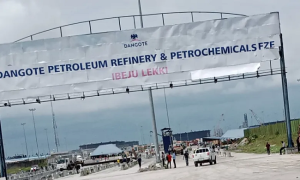On June 26, 2024, Nigeria witnessed a fire outbreak at the Dangote Refinery and Petrochemicals Company in the Lekki Free Trade Zone, Lagos. Fortunately, the company successfully managed the fire outbreak, and a press release by Anthony Chiejina, the company’s Group Head of Corporate Communications, described the incident as a minor fire at the refinery’s effluent treatment plant with no casualties recorded.

However, this event, minor as Anthony may have described it, highlights the gravity of potential environmental risks linked to refinery operations and increased carbon emissions. This refinery is just over a year old – inaugurated in May 2023 – and began operations barely six months ago. Thus, one cannot say the fire was due to ageing infrastructure, as it has been in some cases.
Refineries are high-risk environments by nature. They handle volatile substances that can lead to disastrous accidents if not carefully and meticulously managed. The Dangote Refinery, one of the largest in Africa, is no exception. Fires, explosions, and spills are just a few of the hazards that can result from refinery operations, posing significant environmental and public health risks.
A primary environmental concern during refinery fires is releasing a toxic mix of air pollutants, including sulphur dioxide, nitrogen oxides, carbon monoxide, particulate matter, and volatile organic compounds. These pollutants can significantly worsen air quality, contribute to acid rain, and cause respiratory issues for people living near the refinery.
In the case of Dangote Refinery, the fire at the effluent treatment plant raises particular dread about potential water contamination. Effluent treatment plants are designed to treat wastewater before it evaporates into the environment. A fire at such a facility could release untreated or partially treated effluents into nearby water bodies, harming aquatic life and seeping into human water supply.
Globally, refinery fires are not uncommon. In 2019, a massive fire engulfed the Philadelphia Energy Solutions refinery, causing significant air and water pollution and forcing evacuations in surrounding areas. Similarly, in 2012, a fire outbreak occurred at Venezuela’s Amuay Refinery, one of the largest in the world. The fire, triggered by a gas leak, caused an explosion that killed 47 people and injured over 80. The environmental impact was severe, with extensive air and soil contamination reported. These incidents show the potential for catastrophic consequences.
With its vast oil reserves, Nigeria has witnessed its share of environmental harm from refineries. Often, these incidents surface in illegal oil refineries, usually in the Niger Delta region. The region has several makeshift refineries, frequently concealed within the dense mangrove forests.
In 2023, there was an oil spill from the Trans-Niger Pipeline operated by Shell that crosses through communities in the Eleme area of Ogoniland, contaminating farmlands and a river in the Niger Delta region. Before that, in 2005, the Oruma community in Bayelsa State suffered an oil spill from Shell’s facility, which destroyed fishponds, farms and trees, losing their sources of livelihood.
The environmental impact of refinery fires and disasters transcends this isolated incident. Fossil fuel burning contributes to carbon emissions, driving climate change. It accounts for approximately 75% of global carbon dioxide (CO2) emissions and nearly two-thirds of all greenhouse gas emissions.
These emissions contribute to alarming rising global temperatures, extreme weather events, and rising sea levels, posing a grave threat to the planet’s ecosystems and human populations. These effects are already evident in Africa’s most populous country.
Moreover, the Dangote Refinery incident unearths questions about the company’s commitment to environmental safety and transparency. While they described the fire as “minor,” a complete investigation into the cause is crucial for public knowledge. The incident calls for stricter regulations and independent monitoring of refinery operations in Nigeria.
It is unthinkable to see that since the fire outbreak, no government oversight agency, such as the Nigerian Midstream and Downstream Petroleum Regulatory Authority (NMDPRA), has gone to the refinery to find out what happened and inform the public about its findings. But it is back to business after just a press statement.
The only way to mitigate the risks associated with refineries is to begin a phase-out of fossil fuel usage in Nigeria. Decades of using fossil fuels for energy development in Africa have yet to yield the needed results. Instead, we should intensely pump investments into renewables. Africa is rich in renewable energy sources, including hydro, sun, wind and others.
Nigeria, especially, has abundant renewable energy sources. Renewables report by IRENA shows that renewable energy sources can meet nearly 60% of Nigeria’s energy demand in 2050. which could cut the country’s demand for oil by 65% and natural gas by 40%, and renewables could account for 47% of total energy demand by 2030 and 57% by 2040.
The Dangote Refinery fire should be a warning reminder for all stakeholders to be highly vigilant. It carries the weight of urgency of prioritising environmental safety and emission reduction within the oil and gas industry. It is more important in Nigeria, where regulatory frameworks are less stringent than those in more developed nations.
If we continue to burn fossil fuel, we must implement stricter regulations focusing on emission control and waste management practices, investing in safety measures, enforcing transparency policies and exploring cleaner technologies. We must not wait for another “minor” incident to bring about necessary changes. The health of our country’s ecosystems and the well-being of our communities depend on it.
By Israel Prince Orekha, Executive Director, Connected Advocacy
